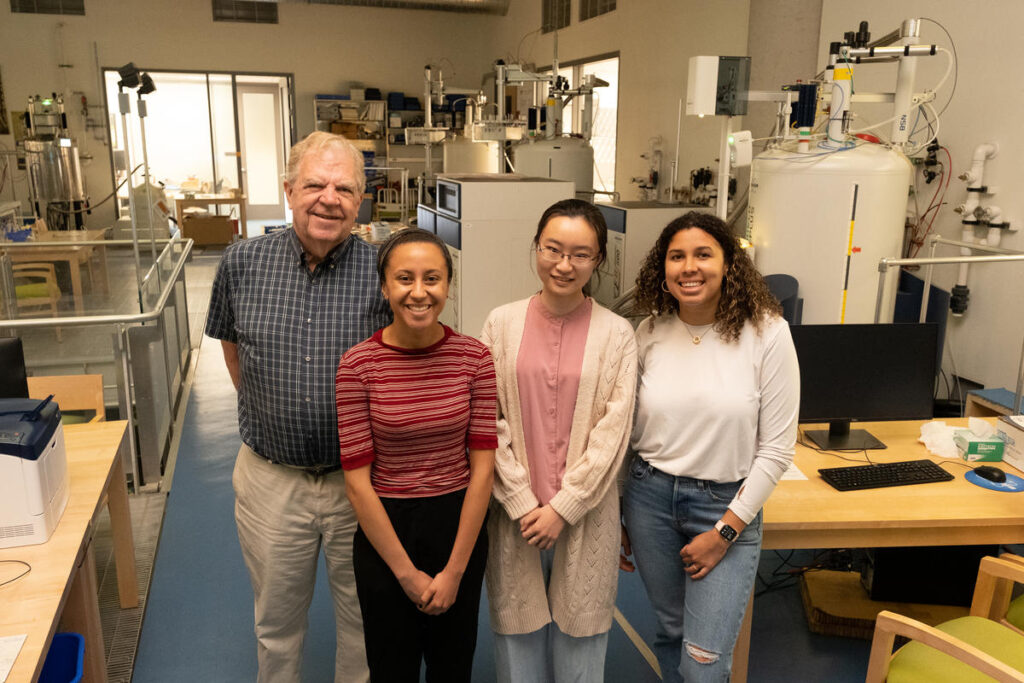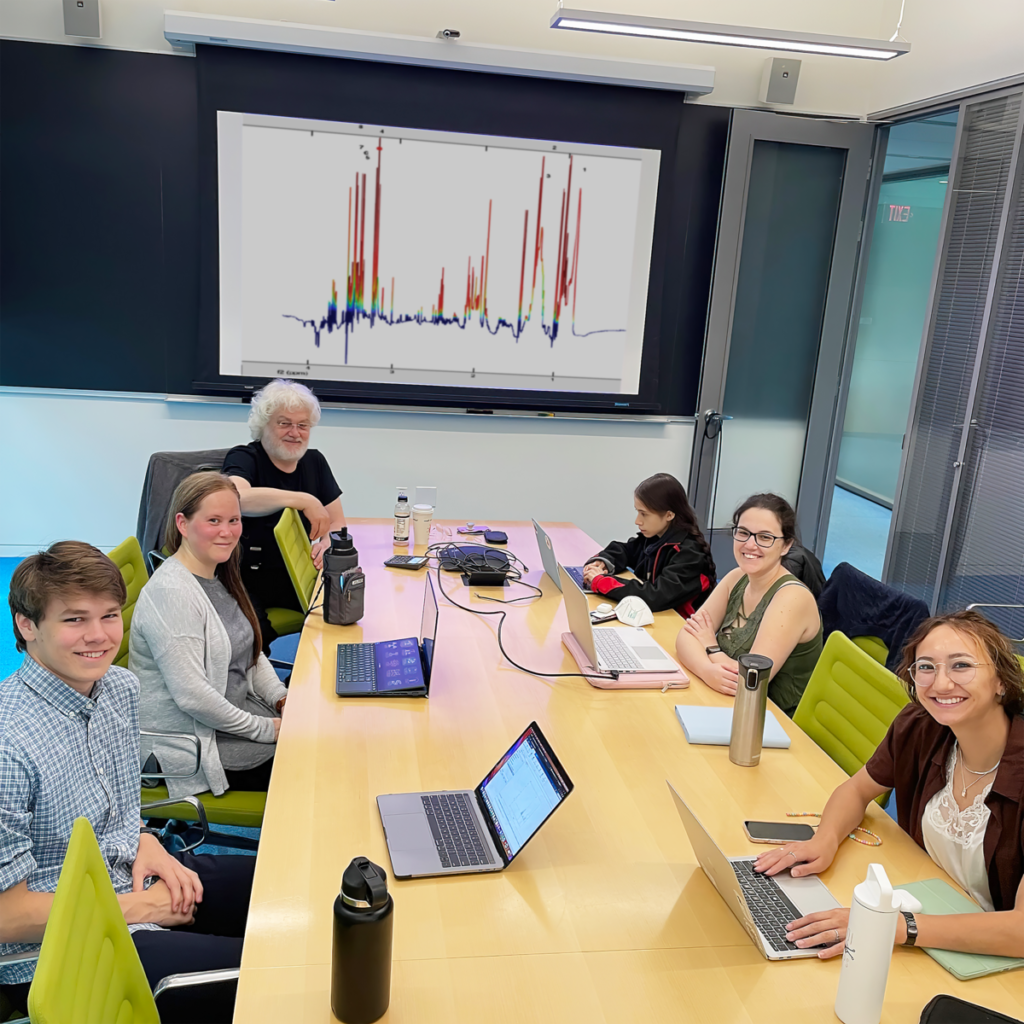Summer Undergrad Programs in Full Swing With SURF-C, REU

The Department of Chemistry is cultivating the next generation of scientists through a multi-faceted undergraduate summer immersion program at Frick Lab, for both internal and external students.
Under the leadership of Susan VanderKam and a cadre of faculty with a keen interest in hosting students, the Summer Undergraduate Research Fellows in Chemistry (SURF-C) was launched earlier this month for nearly 40 undergraduates from Princeton and institutions around the country.
In addition, the National Science Foundation’s Research Experience for Undergraduates (REU) is sponsoring nine students in a program run for 20 years by Jannette Carey, associate professor of chemistry.
“In order to build diversity in chemistry, you have to find scholars you might not be able to reach through conventional channels, and prepare them to go into graduate school and to take their place in the chemistry community,” said VanderKam, the Department’s manager of diversity initiatives, associate director of the undergraduate program, and senior lecturer in chemistry.
“The opportunity to understand all of the frustrations and all of the joys and actually getting research to work is not something you will get in a class,” she added. “The summer program allows these students to spend full time in the laboratory and learn a lot about doing research. They work not only with faculty members but with grad students and postdocs who serve as their mentors.”
SURF-C stewards 36 students
SURF-C programs for undergraduates include the Charles H. Leach II Summer Scholars Program for Princeton students interested in exploring a concentration in chemistry; the Leadership Alliance Summer Research Early Identification Program, which has been in place at Princeton Chemistry since 2014 and covers external students from historically underrepresented groups who are considering graduate school; and Summer Research Internships for senior chemistry concentrators at Princeton to gain the in-lab experience needed to build their senior theses.
SURF-C students participate in lab research and build community through weekly meetings and social outings. VanderKam also hosts a series of weekly workshops in scientific communication, which focus on skills needed in scientific writing and presentation, such as creating a research poster, writing an abstract, and using specialized graphics software.
The program offers industry speakers and an end-of-season symposium, as well as lab and fire safety training, library training, and responsible conduct training.
One SURF-C student, Nora Hubbard, is visiting through the Leadership Alliance as she works with the Yang Lab on a project to increase the fluorescence of mSOX’s flavin cofactors.
“I come from a small school, so to be able to participate in one of the best chemistry departments across the country is a huge opportunity,” said Hubbard, an undergraduate at the College of St. Scholastica.
“I am majoring in biochemistry and have also enjoyed taking courses in analytical and physical chemistry, so Dr. Yang’s lab seemed to be the perfect mix. By the end of this program, I hope I will be able to observe mSOX’s fluorescence at a single-molecule level through nanoparticle enhancement,” she said.
Rising Princeton sophomore Natalia Maidique was in a general chemistry class this spring taught by Paul Chirik, the Edwards S. Sanford Professor of Chemistry, and liked it so much that she applied for, and was accepted into, the Leach Program. She is currently working in the Chirik Lab for the summer, synthesizing and characterizing high energy polymers from monomers that have been bioderived from carbon dioxide.
“I think what I’m most looking forward to, when we near the end of our project, is stepping back and puzzling together all the different things we’ve been discovering,” said Maidique. “It’s one thing to get results and analyze them as you go along, but I think that it’ll be really cool to look back and see how all the data and experiments I’ve played a role in have come together to tell a story about what we’re trying to achieve.”
The senior thesis is the capstone of a Princeton undergraduate career, so summertime affords an opportunity for rising seniors to polish the skills and research that will underpin a successful thesis. Some 16 rising seniors are working in-lab this year as summer interns with various faculty members.
The end-of-program symposium for SURF-C participants is currently scheduled for the afternoon of July 28th. It will include a presentation in Taylor Auditorium, a poster session, and a reception.
REU emphasis on community college students
Under the NSF, the REU program flourishes each summer with the participation of students from colleges and universities across the country. The focus at Princeton has been fostered by Carey with an annual commitment to bringing community college students to campus.

István Pelczer during a weekly morning meeting with some of the undergraduates involved in the Department's SURF-C and REU programs.
The program centers on cross-disciplinary research in molecular biophysics.
This year, nine students will advance their backgrounds in the physical, mathematical, and engineering sciences by studying biological molecules with faculty all over campus, including three at Princeton Chemistry.
“I find it remarkable that the NSF enables us to invent a program of our own design that would benefit these students,” said Carey. “I recruit all over the country at community colleges and bring those students here who would otherwise have no opportunity to do research.
“Without an opportunity to experience research themselves, they may not contemplate going beyond their associate’s degree. Nowadays, many students simply cannot afford four years of university, so they may not have an opportunity for research. The REU experience gets them in the door.”
István Pelczer, director of the Department’s NMR Facility and co-director of the biophysics REU, has been a longtime faculty supporter of summer students. He runs weekly meetings for students from both REU and SURF-C.
“I find it special, in a sense, that the invited students are from otherwise underrepresented and/or disadvantaged populations, who then can get the opportunity to be involved in top-level science at a top university,” said Pelczer. “This is important for learning how to do involved research, communicate, be self-sufficient, and represent themselves.
“The weekly luncheons and meetings are used to discuss important issues not only related to science, but culture, society, and human interactions, etc. And the final, end-of-summer presentations are a serious business.”
Unusually, Princeton’s molecular biophysics REU program also carries funding to send alums who successfully complete the Princeton program abroad for a second summer of research in the Czech Republic. Student researchers work with the Institute for Nanobiology and Structural Biology of the Academy of Sciences of the Czech Republic in Nové Hrady, South Bohemia, where the research and the living quarters are housed in a renovated castle.
“This provides an exceptional opportunity for the students to not only be part of serious science projects, but to get the taste of the very different culture and history of Europe,” said Pelczer.
REU participants prepare a final slideshow presentation, a poster, and research paper as part of their fulfillment of the program.
A Molecular Biophysics REU Poster Session will be held in the Bowen Hall Atrium/Auditorium on Thursday, August 4, from 6 p.m. to 8 p.m.
